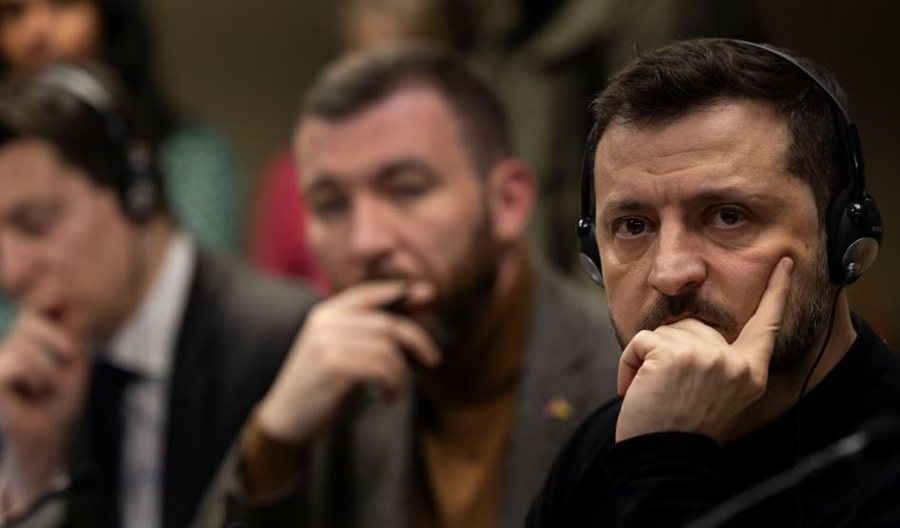
Ukrainian President Volodymyr Zelenskyy said on Sunday that his country is ready to sign a rare earth minerals deal with the United States and that he believes it can save relations with US President Donald Trump.
At a press conference after a meeting of European leaders in Britain, Mr Zelensky said he thought the United States would also be willing to sign the minerals deal, but it might "take time to analyze some things".
The two sides were expected to sign an agreement last week during a visit by Mr. Zelensky to the White House, but the deal fell apart after heated exchanges during a meeting with President Trump and Vice President J.D. Vance.
President Zelensky said on Sunday that Ukraine relies on the help of the United States in its fight against Russia.
“I think that stopping such assistance will only help (Russian President Vladimir) Putin,” Mr. Zelensky said. “And because of this, I think that the United States and representatives of the civilized world, the leaders of this world, will definitely not help Putin.”
President Trump called Mr. Zelensky ungrateful during their meeting on Friday and has sought the minerals deal as a way to reimburse the United States for billions of dollars in aid it has given to Ukraine.
President Trump has stressed the need to end the war and held a phone call with Vladimir Putin, in addition to senior US officials meeting with Russian officials in Saudi Arabia to discuss a possible peace deal, without including Ukrainian officials in the talks.
"We should spend less time worrying about Putin and more time worrying about the gangs of rapist immigrants, drug lords, murderers, and people from mental institutions coming into our country so we don't end up like Europe!" President Trump wrote on his "Social Truth" platform on Sunday.
This followed Sunday's talks in London, during which British Prime Minister Keir Starmer told 18 allies that with the United States wavering in its support for Ukraine, Europe finds itself "at a historic crossroads."
"This is not a moment for more talk - it is time to act. It is time to rise up, lead and unite around a new plan for a just and lasting peace," said Prime Minister Starmer.
The British leader said that without a guarantee of US involvement to act as a back-up to any potential peacekeeping force, "Europe must take on the heavy burden" of securing peace in Ukraine. He said there was a "coalition of the willing" ready to help protect any ceasefire.
Meanwhile, President Trump's national security adviser, Michael Waltz, speaking of Mr. Zelensky, told CNN's "State of the Union" on Sunday that "what was not clear to us was whether he shared our goal of ending this war. It was not clear that he was ready to move toward peace."
Unlike in Washington, Mr. Zelensky was warmly welcomed at the London meeting by many of the European leaders, along with Canadian Prime Minister Justin Trudeau and NATO chief Mark Rutte. Mr. Zelensky's supporters gathered outside Mr. Starmer's residence in support of Ukraine.
European Commission chief Ursula von der Leyen warned that "we urgently need to rearm Europe" and "prepare for the worst" on the continent.
Polish Prime Minister Donald Tusk called on the United States and Europe to "speak with one voice" to show Russian President Vladimir Putin "that the West has no intention of capitulating to his blackmail and aggression."
On Sunday, Mr Zelenskyy met with King Charles at his private residence in Sandringham.
The Kremlin said Sunday that the United States' dramatic shift in approach to Europe's foreign policy toward Russia is largely in line with Moscow's view.
"The new administration is rapidly changing all foreign policy configurations. This largely coincides with our point of view," Kremlin spokesman Dmitry Peskov said in an interview with Russian state television, which was recorded last Wednesday.
No peace negotiations are planned.
President Trump's national security adviser, Michael Waltz, said that ultimately Russia and Ukraine will have to make negotiating concessions to reach a peace agreement. "There will be all kinds of carrots and sticks to do that," he said.
US Secretary of State Marco Rubio also stressed the importance of both sides sitting at the negotiating table.
"We are trying to end the war," Secretary Rubio said. "You can't end a war unless both sides sit down at the table, starting with the Russians. And that's the issue the president has emphasized."
Prime Minister Starmer said Britain, France and Ukraine have agreed to work on a ceasefire plan to present to the United States. Several European countries have said they are willing to send peacekeepers to Ukraine to help implement a possible peace deal, but need the United States to provide backup military support to confront Russia in case Putin agrees to a ceasefire and then violates it or launches a new aggression.
President Trump has rejected any offer of such support from the United States and said he trusts Putin to respect any solution he agrees to.
Prime Minister Starmer said he doesn't trust Putin, but he trusts President Trump.
"Do I believe Donald Trump when he says he wants lasting peace? The answer to that is yes," he said.
Mr Starmer said there were "intense discussions" about a US security guarantee as one of several components for a lasting peace.
"If there is going to be a deal, if there is going to be a ceasefire, then that deal has to be defended, because the worst of all outcomes is a temporary pause and then Putin acts again," Prime Minister Starmer said. "That has happened in the past, I think it is a real risk and that is why we need to make sure that if there is a deal, it is sustainable, not a temporary pause."/ VOA (A2 Televizion)











